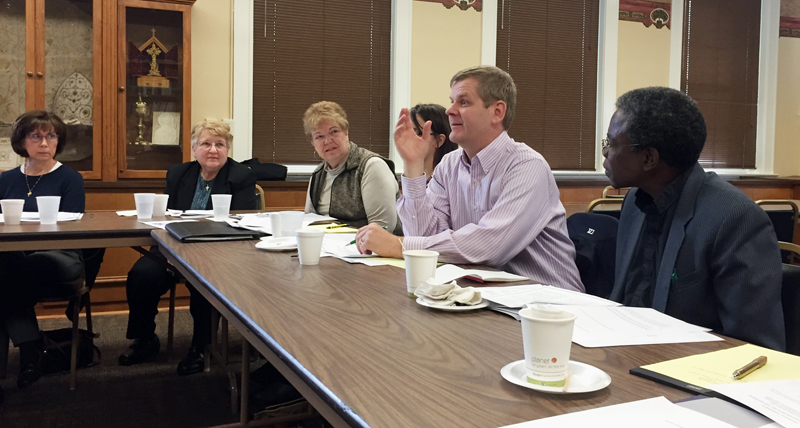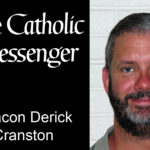By Barb Arland-Fye
The Catholic Messenger
DAVENPORT — In the 2011 documentary video “Choosing to Die” a 71-year-old British billionaire, his wife seated beside him in a house in Switzerland, calmly says that he is ready to die. Also present in the room is a woman who will give him a small cup containing a lethal dose of a barbiturate. She asks the man several times if he wants to take the medicine that will kill him. The billionaire, who has a progressive disease, responds “Yes,” each time.

Kirk Kuiken of Iowa City shares his thoughts during an Advance Care Planning workshop Oct. 28 in St. Vincent Center, headquarters for the Diocese of Davenport. Workshops like this one are one component of an Iowa Catholic Conference (ICC) initiative to prevent doctor-prescribed suicide (or physician-assisted suicide) from becoming law in Iowa.
Participants in an Oct. 28 workshop on Advance Care Planning in the Davenport Diocese watched in stunned silence as the man swallowed the deadly drink. What they viewed was the antithesis of Catholic teaching on death and the dying process. Catholics believe that every human being deserves to die naturally, not medically, and that advance care directives make it possible for pain and suffering to be relieved in ways that respect Catholic teaching.
But assisted suicide advocates are gaining ground. The workshop is one component of an Iowa Catholic Conference (ICC) initiative to prevent doctor-prescribed suicide (or physician-assisted suicide) from becoming law in Iowa. Compassion & Choices, a national nonprofit organization, sought in 2015 and 2016 to persuade the Iowa Legislature to legalize doctor-prescribed suicide. Although the legislation did not advance, advocates intend to try again in 2017.
Many Catholics may be unaware of Catholic teaching on end-of-life decision making, so education is another component of the ICC initiative. That process began with a statement from Iowa’s bishops earlier this year and columns from each one about different aspects of Catholic teaching on the issue.
Now the workshop’s instructors are training Iowa Catholics to serve as consultants to work one-on-one with their fellow parishioners and walk them through the process of executing advance directives from a Catholic perspective.
“Advance Care Planning is a process that takes place over a lifetime,” observed Janine Marie Idziak, who facilitated the workshop in Davenport at diocesan headquarters. She serves as health care ethics consultant for the Archdiocese of Dubuque, Iowa, and director of the Bioethics Center at Loras College, also in Dubuque.
She identified three stages of Advance Care Planning. Stage one focuses on individuals who are healthy or have well-managed medical conditions. Stage two addresses persons with serious or chronic conditions and/or a progressively debilitating disease. The third stage concerns persons diagnosed with a terminal illness or who may be dying. Each stage impacts the advance directives.
Designating a Durable Power of Attorney (DPA) for Health Care is one of the first steps individuals should take in Advance Care Planning, Idziak noted. A DPA is someone the individual knows and chooses and who can speak on that individual’s behalf if the individual is incapable of making decisions.
Colleen Walters, chief mission integration officer for Mercy Health Network-Iowa Regional Health Ministry, presented a case study for workshop participants to consider. It involved family members who were at odds over their loved one’s wishes for end-of-life care. Father George Ssebadduka, a chaplain at Mercy Medical Center in Clinton, observed that such situations are not uncommon in the hospital setting. Chaplains need to be part of the discussion when such situations arise, he said. “Left alone, families often default to what feelings they had before (the current crisis). The chaplain can come in to help all of the various sides and assist them to look at the whole picture.”
Idziak explained the importance of church teaching on benefits and burdens. In discerning Advance Care Planning, individuals need to be asked: ‘“What types of treatment are most important to you?’ ‘What things are most burdensome?’ Maybe they want to live to see the birth of a first grandchild or another grandchild. That would be the benefit,” Idziak said. “Judging how to evaluate the burdens has a lot to do with perspective,” she continued. “Is my cancer going to get better?” someone might ask. Other considerations include social ones, such as the ability to get out and engage with others.
Among forms of treatment covered in the workshop was assisted nutrition and hydration. Participants discussed under what situations medically assisted nutrition would be obligatory and under what situations it would be considered excessively burdensome for the patient.
Workshop participants also learned about the Iowa Physician Orders for Scope of Treatment (IPOST) from a Catholic perspective. The IPOST is a medical order based on what an individual specifies in his or her advanced medical directive. This document is intended for an individual in the last year of life, someone who is terminally ill, frail elderly or has a serious illness from which recovery is not expected. The IPOST does not violate Catholic teaching on end of life decision making, the instructors emphasized. The IPOST can be periodically reviewed and modified as a person’s condition changes.
“We have learned that those facing severe illness desire two things, 1) autonomy which allows them control of their destiny and 2) assurance of appropriate pain relief,” Walters said. “Both of those things are addressed in the Supportive Care Iowa initiative endorsed by the Iowa Bishops. Physician-assisted suicide provides only a culture of societal acceptance of suicide for all age groups as evidenced by the suicide rate in Oregon which is double the national average.”
For more information on Advance Care Planning, please contact colleen.walters@trinity-health.org.











